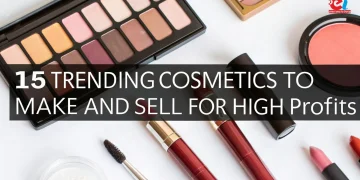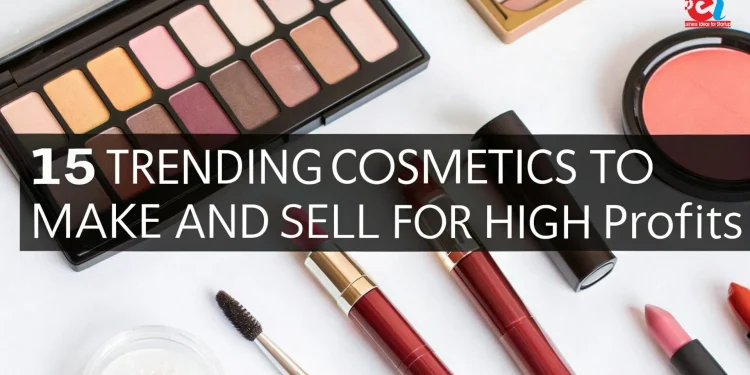In 2025, the world of cosmetics will transform completely due to increased focus on wellness, sustainability, and personalization. Today, India boasts one of the fastest growing cosmetic business markets in the world. This is due to the demographic dividend and increasing beauty consciousness among men and women. Thanks to the growth of e-commerce, influencer marketing, and clean beauty, new types of products are being demanded. The use of advanced technologies in natural, herbal, and dermaceutical mercials has shifted the expectations of the general public. The Indian cosmetic industry is expected to exceed 28 billion dollars in 2025. Desailing entrepreneurs stand to benefit greatly from meeting young consumers’ constantly changing needs.
The consumers after pandemic are more careful with the ingridients, packaging, and the ethics of where products are sourced from. Even in highly competitive segments, brands that provide transparency and sustainable options care skincare are doing well. In addition, MSMEs have easier access to enter the market through low cost manufacturing technologies, private labeling, and Amazon, Flipkart, Nykaa and other emerging platforms. Through ideal product curation, strategic aligned offerring with consumer expectations can help steer profitable cosmodetic ventures. Below is a compilation of the 15 most valuable cosmetic business that are predicted to dominate the market in 2025 and their strategic relevance for Indian industries.
1. Face Serums: Pioneering the Custom Care Industry
Face serums like moisturizers are a daily part of skincare routines. Unlike moisturizers, serums like Vitamin C, Niacinamide, and Retinol are lightweight and penetrate into the skin aiding in treating pigmentation, fine lines, and dehydration. Aided with social media, skincare has become a passion for many especially in the urban centers, and so has face serums making it a beauty must have. The phytochemical extraction is less complex, providing ample opportunity for differentiation through organic certification, botanical actives, or dermatological validation. Locally and abroad, brands dealing in all natural tea tree, licorice, and turmeric are gaining traction.
2. Daily Clean and Gentle Herbal Face Wash
Herbal face washes are on the rise and demand is likely to increase with the introduction of face washes that are free from chemicals and provide gentle cleansing. Such products incorporate Indian traditional herbs including neem, tulsi, aloe vera, and sandalwood for their anti-bacterial and anti-inflammatory functions. The modern customer wants sulfate- and paraben-free face washes for everyday use which gives opportunity to newer brands rooted in Ayurvedic and Unani medicine. The manufacturing of herbal face washes can also make use of lower barriers to entry as small-scale units or cottage industry units can easily scale up through contract manufacturing or white labeling.
3. Lip Tints and Cheek Stains – Modern Day Feminine Aesthetic
The trend of minimalist makeup continues to peek in importance and forefront are the multifunctional products such as lip and cheek tints. The Gen Z and Millennial demographics lean more towards functional, compact, and skin-friendly ingredients, unlike traditional lipsticks or powder blushes, tints are lightweight and infused with nourishing oils, resulting in a more natural appearance. Their portability and aesthetically pleasing packaging make them ideal for online-only cosmetics brands, and their Instagram-friendly branding adds to the appeal. Startups producing vegan or cruelty-free options will gain popularity in both India and international markets.
Related: Building a Success in the Cosmetic Industry with Serum, Cream and Shampoo
4. BB and CC Creams: When Beauty Care Products Have an Aesthetic
BB (Beauty Balm) and CC (Color Correcting) creams provide the ultimate mix of use and aesthetic. The increase in natural-looking makeup has given rise in the use of BB and CC creams, which are now essential for students and working professionals. These two-in-one creams typically contain SPF, moisturizers, and light pigments. To manufacture these, there is a need to work with formulation chemists which does provide better profit margins when released in bulk, especially with varying shades suited for Indian skin.
5. Oily and Serum Products Focused on Hair: An Indispensable Care Component
One of the most prominent problems both men and women have in India is hair fall still remains an issue. This is the reason for the high demand of hair serums and oils in the country. The products integrating Ayurvedic herbs like bhringraj, amla , brahmi and fenugreek with modern actives like caffeine or peptides are most preferred in the market. We all know that the Indian market is heavily inclined towards products which have clinical efficacy and visible results in 4 to 8 weeks. Men’s beard care alongside postpartum hair concerns for women have relative growth which means that niche products marketed under the haircare category will be highly effective in generating brand loyalty.
6. Sunscreen: Why Winter Isn’t the Only Time It’s Needed
India has been increasingly focused on ray protection and this in turn has changed sunscreen into a daily necessity instead of seasonal. The modern customer understands the destruction from UVA, UVB, blue rays and pollution. The highest popular products in the market are gel, non-comedogenic, SPF 50+ sunscreen which does not cast a white layer. Interest towards tinted sunscreens is also on the rise alongside mineral based sunscreens (zinc oxide or titanium dioxide) which can be used on sensitive skin. Business owners can target these markets with children’s sunscreen as well as sport application for trekkers and swimmers. This promotional opportunity is unmeasurable in terms of profit for MSME’s and startups.
7. Beard Grooming Kits: Men’s Cosmetics on the Rise
There is a clear shift and acceptance towards men’s grooming and fashion. Products like beard oils, balms, washes, and grooming kits are now commonplace among the millennial population in metro cities. Influencers and style icons are sporting facial hair and grooming products, shifting this segment from niche to necessity. Beard grooming products incorporated with essential oils and vitamins sell highly on ecommerce platforms. For entrepreneurs, starting a men’s cosmetic brand that utilizes D2C channels can guarantee fast growth at low operational costs.
8. Compact Powders and Loose Translucent Powders
The focus has shifted drastically from full coverage foundation to lightweight makeup that remains polished. Compact powders with a sebum control matting finish are rapidly sold out. There is also a high chance for success for brands selling translucent, mineral-based, or color-correcting powders. All these products are easy to carry and ideal for digital advertisement. With the right design and ingredient blend, even small and medium enterprises can contend with established global brands.
9. Sheet Masks and Under-Eye Patches: The Self-Care Boom
As self-care has turned into more of a routine activity, there has been an increase in the sale of sheet masks and under-eye patches in Indian skincare stores. These products are single-use and mess free, which suits their busy consumers. Korean-inspired types and those with a lot of collagen and vitamin C are particularly popular. They are very easy to mass produce and perfect for gift sets or subscription boxes. Because these are low in weight and shelf-life, they are very good products for e-commerce and international shipping.
10. Nail Polishes and Nail Care Kits
With the limited access to salons post-2020, there was a surge in the demand for DIY manicure products. This has only increased in 2025, as consumers stock up on nail polish, nail strengtheners, cuticle oil, and UV gel nail kits. Water-based nail polishes, bright colors, and long-lasting formulas are in high demand. There is a growing market around personalized colors and themes for nail art cosmetics, especially those selling non-toxic or vegan formulas.
11. Ayurvedic Kajal and Eye Pencils
With the resurgence of Ayurvedic products, herbal kajal and eye pencils are making a return. These are very famous among mothers for their kids and younger ladies who shun chemicals-based cosmetics. Items prepared from almond oil, castor oil with camphor have great aesthetic and health value. The production of these goods is not highly sophisticated and can be set up in semi-automatic workshops, which is why these products appeal to small business entrepreneurs in the cosmetics field.
Related: Personal Care and Cosmetics: Eco-Friendly Ingredients for Local Production
12. Peptide-Based Anti-Aging Creams and Moisturizers
Consumers in their 30s and 40s are starting to adopt proactive care routines. As a result, the anti-aging segment is growing rapidly. These include the more expensive retinol night creams, peptide-based moisturizers, and even antioxidant-day creams. Consumers in this segment are already brand loyal and less price-sensitive. Such products are self-sustaining in building strong retention with clinical trials or visible efficacy claims. For the manufacturers, there is good margin to gain branding opportunities with lower SKUs to manage.
13. Tinted Moisturizers, Hydrating Primers, and Creams
The crossover of makeup and skincare has led to the development of the moisturizer and hydrating primers for use in professional and casual settings. In addition to light coverage, hydration, and sunscreen, these products prepare the skin. They are especially popular among content creators and working women. Students in college also tend to gravitate towards these products. Market traction can be gained by offering Toned Indian Skin Shades that deliver on performance. These hybrid products are favored in the D2C space with influencer marketing.
14. Clay Masks and Mud Packs for Detoxification
The use of detox clay masks crafted from multani mitti, bentonite clay, and charcoal is on the rise. They are marketed as modern solutions to age-old remedies which offered relief from excess oil, blackheads, and dull skin. A new level of innovation is achieved when Indian turmeric, saffron, or tulsi is blended with global French green clay or Himalayan pink salt. In this case, it is also all about the packaging. The contestants who win the competition around visually appealing and Instagrammable designs of clay masks tend to outperform others.
15. Cosmetic Industry Supported by NIIR Project Consultancy Services
Cosmetic business update their product lines along with foremost a deep understanding of market dynamics, relevant laws, the cost of production, and marketing frameworks. This is where Niir Project Consultancy Services (NPCS) assists. NPCS provides detailed project reports (DPR), feasibility studies along with formulating guidance, and offers assistance in setting up the plant and financing to new entrepreneurs. NPCS helps aspiring cosmetic entrepreneurs optimize their strategies providing assistance in raw material procurement, machinery acquisition, and trend responsive private label product development. NPCS’s support extends to the entire beauty industry value chain from ayurvedic cosmetic plant setup to the formulation of clinical skincare lines.
Summary: Looking Ahead at The Cosmetic Business in 2025
The cosmetic business in 2025 will be centered on informed consumers, digital discovery, and beauty that serves a function. Those who strategically react to the growing need across numerous skincare and grooming categories will reap the rewards of their agile and innovative efforts. From building a complete product line of sunscreens and serums to a single face serum, success relies on marketing, quality, and market differentiation. Experts like NIIR Project Consultancy Services provide targeted guidance that makes the transformational journey of meritful concepts into profitable cosmetic brands effortless and favorable.


















